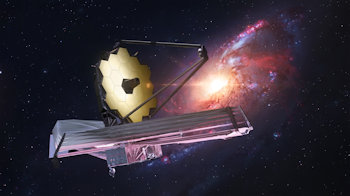With another year over and more global issues to address, not only are there many technologies and innovations to reflect on this year, but there are also exciting new developments on the horizon for 2023.
Year in Review: 2022's Top New and Emerging Technologies
Article from | Knight Optical
From energy solutions, 3D printing, extended reality and genomics to artificial intelligence (AI), machine learning and even smarter devices, 2022 has been a hive of activity in the worlds of science and technology.
Just visit the news section of our website, and the many pages of blogs on new innovations are a testament to the bustle that’s been taking place across various industries this year. Catch up on our blog series here.
With global issues, such as the ongoing Ukraine-Russia war, the fight against climate change, lingering concerns surrounding COVID-19 – as well as new worries about recent outbreaks of Group A streptococcus (Strep A) and what’s currently been described as the world’s worst-ever outbreak of bird flu – new devices and research and analyses systems have been launching in every corner.
Let’s begin with one of the more widely publicised stories of 2022 & how optics and laser technology plays a part.
Viewing outer space through a new lens
This year, astronomers far and wide sat tight anticipating a long-awaited announcement from NASA. On Christmas Day in 2021, the $10bn James Webb Space Telescope (JWST) launched after many delays. Despite the challenges faced with launching the JWST, which included “unpacking manoeuvres” and “unfurling its tennis court-sized sunshield”1, the telescope captured its first collection of images in early July 2022.

Captivating the world, the JWST first released its primary full-colour ‘deep-field’ image, known as ‘SMACS 0723’, which depicts light magnification and distortion of objects behind galaxy clusters. Following this announcement, four more images were unveiled the very next day, which includes shots of nebulae, a galaxy constellation, and the atmospheric spectra of an exoplanet.

Human Or Robot?
Designed by robotics company Engineered Arts, Ameca went viral in 2022 when the humanoid was revealed at the Consumer Electronics Show 2022 at the start of the year. What’s being described as “the world’s most advanced humanoid robot”, Ameca can smile, blink, frown, and make other expressions that are uncannily like a human’s mannerisms.
Built based on 3D scans of real-life people, Ameca not only imitates expressions but also has similarities when it comes to bone structure, skin texture and frown/wrinkle lines. Currently, Ameca runs on pre-programmed, life-like movements, and doesn’t make use of Artificial Intelligence (AI). While, the British robotics company doesn’t predict official models for another 10 years, Ameca is a fantastic candidate for our list of 2022’s biggest technological breakthroughs.

The Future of Aviation?
Following the sales of electric cars reaching a high in 2021, and their continued popularity this year, it comes as no surprise that the waves this technology has caused are rippling into the aviation sector.
There are three noteworthy mentions in this category that have made impressive strides towards a greener future for the aviation industry. Firstly, British luxury car manufacturer and aero-engine manufacturing giant Rolls-Royce revealed some record-breaking developments for its electric aircraft demonstrator, ACCEL. An acronym translating into ‘Accelerating the Electrification of Flight’, the ACCEL aircraft achieved a world-record all-electric flight of 345.4mph. Although the flight officially took place in 2021, 2022 was the year that it was verified as a ‘record’ by the World Air Sports Federation2.

Up next is Eviation’s electric commuter airplane, Alice, which took its very first flight at the end of September 2022. Flying above Washington and hitting a speed of about 171mph, Alice was air bound for a total of eight minutes. Intended to carry nine people, the aircraft aims to “reimagine regional travel”.
Meanwhile, in May, another electric aircraft made impressive headway. Envisioned for logistics use, for cargo purposes, Beta Technologies’ Alia made a journey that rounded up to 1403 miles. Stopping and starting along the way, as it would if used for delivery dedications, Alia started in New York on May 23rd and made its final stop on May 30th in Arkansas after seven stops in total.
Electric-Powered Vessels
Electric methods of transportation seem to be taking the spotlight in our yearly round-up. From the road and the sky to the sea, EV-powered vehicles, aircraft, and boats are being revealed throughout all corners of the globe.
For example, Swedish company Candela’s P-12 Shuttle (not pictured) is an electric passenger vessel that strives to offer “convenient cross connections in waterfront cities”. The brand also claims that this method of transport isn’t only eco-friendlier but is “on many routes, a faster alternative to cars”. Working on ‘computer-stabilised hydrofoils’, the P-12 Shuttle provides passengers with the smoothest on-water experience and claims to be “400% more energy efficient than any other fast vessel3”. By hydroplaning, Candela’s vessels use less power than conventional boats require.

Autonomous Vessels
Equally as inventive as Candela’s electric vessels, the AI-captained autonomous marine research ship, The Mayflower, is the first of its kind. Equipped with IBM technology, The Mayflower is designed to gather ocean data surrounding the impact of climate change and was set to follow the original three-mast Mayflower’s transatlantic route. Working with marine research and exploration specialist ProMare to co-engineer the boat’s software, IBM equipped the self-operating ship with three layers of tech. This includes: ‘sensory inputs’, ‘real-time machine learning and analytics’, alongside a ‘decision engine4’.
This year, on June 30th, the Mayflower successfully arrived at Plymouth in Massachusetts after a voyage across the Atlantic from Plymouth in the UK!

Ultracold Chemistry
Of course, alongside the high-tech breakthroughs that we’ve witnessed in 2022, there are also tremendous scientific developments that are certainly notable in the often-intertwined realms that we work in of science and technology.
With a profound presence in the chemistry sector, we often observe some incredible firsts that are often challenging for scientists to achieve. This year, as mentioned in Physics World’s ‘Biggest Breakthroughs of the Year’, a group of professionals from educational institutes in China and America have created the first ultracold polyatomic molecules, which was previously difficult to achieve when “containing three or more atoms5”. As Physics World explains this “paves the way for new research in both physics and chemistry”.

A Year to Celebrate
Here at Knight Optical, we supply our optical components and knowledge to all the above industries and more, working on custom and stock optics for everything from experimental breakthroughs in cutting-edge labs through to larger, game-changing AI- and sensor-powered devices on vehicles, ships, and planes as well as revolutionary spaceborne systems and forward-thinking robotics.

Why Choose Knight Optical for your Application?
Discerning customers rely on Knight Optical not only for the premium quality of our output and in-house state-of-the-art Metrology Laboratory and QA Department’s capabilities but because – as well as a range of Stock Optics (available for next-day dispatch) – we also offer our optics as Custom-Made Components.
With over three decades of experience under our belt and a host of long-standing world-renowned customers on our books, we are proud to have worked on some of the most ground-breaking innovations.
We hope you enjoyed our blog about 2022’s top technology and how optics and laser technology plays a huge part in these advancements. If you are looking for premium-quality, bespoke optical components, please do not hesitate to get in touch with a member of the Technical Sales Team here.
The content & opinions in this article are the author’s and do not necessarily represent the views of RoboticsTomorrow
Featured Product

